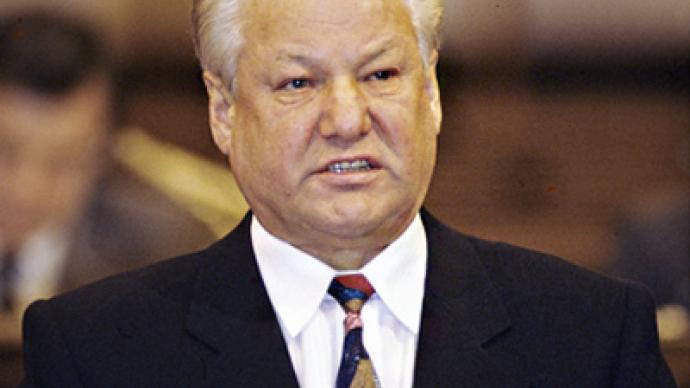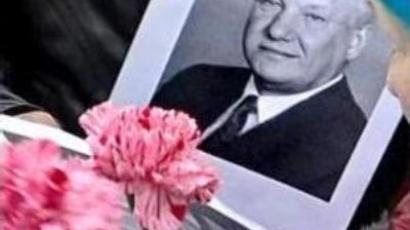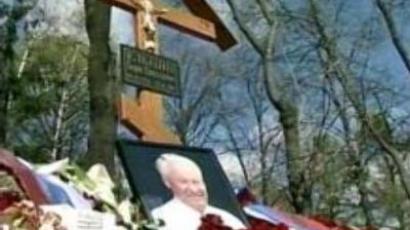Yeltsin was fond of protocol, order and would never be late – former head of protocol

On February 1, Russia’s first president, who took Perestroika to its limits and introduced democracy following the collapse of the Soviet Union, would have celebrated his 80th birthday.
To learn more about Boris Yeltsin, as a politician and as a person, RT’s Sophie Shevardnadze spoke to Vladimir Shevchenko, who followed Russia’s first president everywhere as head of the protocol service.
RT: Thank you very much for your time. So, the New Russia. Yeltsin, the first president of Russia. What were the main new protocol procedures that came with him?Vladimir Shevchenko: I think it would be more relevant to describe about how I got the job. With the New Russia, and Yeltsin as a new president, there was no protocol. We had some innovations with Mikhail Gorbachev when I was head of his protocol – I was the first to assume the position soon after he was elected president of the Soviet Union. We had not succeeded in many respects though. So I was invited to work with Boris Nikolayevich when I had been hired, and we began to build up this protocol. It was indeed rather interesting. Each of us thought he was in charge. So an entourage developed around the president. The first thing to be done was to implement the president’s instructions and create a precedent for protocol.Apparently we would not come up with anything new, because protocol everywhere is always unbending. Most importantly, we drew everybody’s attention to us with this protocol, with this precedence. Now I am pleased to see that protocols are nearly everywhere. There is no such thing that someone says one thing, and someone else says something unexpectedly different.I was very lucky that Boris Nikolayevich and I were very particular about this work. He was fond of protocol, of order and would never be late anywhere. He would find it unacceptable if someone was late. I had the tough task of explaining to him someone’s lateness.RT: Boris Nikolayevich was a very spontaneous person, surely infringements of protocol were inevitable?VS: He was indeed spontaneous, but you know he never infringed protocol. He may have deviated from some etiquette norms and many people confuse these things for protocol.However, he never disrupted any event, was never late, but being emotional he might do something totally unexpected, like the time when he famously conducted an orchestra. Again, it depended on where his mood took him, and you have to understand him – as he turned his head back, there was only the stunned Shevchenko who tried to signal that it should be stopped, while all the rest were just standing around and applauding.RT: Was there any occasion when you felt awkward and were ready to say, “That’s it, I am giving up and quitting.”VS: When I approached him, there was never an instance when he would give up and say, “Go away!” If that had happened, I would probably have quit. But he would always listen to me. It was impossible to guide him, but it was possible to come to an agreement with him, and he would keep his word, while I had the right to keep him in the know.RT: Rumor has it that Boris Nikolayevich personally inspected the gifts handed to foreign delegations and heads of state?VS: Very little is said about Yeltsin as a person. He was a unique person who went through all kinds of things in life. Born into a common family right through his life, to his death, he was always his own man.It’s worth saying first and foremost that he was really into sports – including fishing and hunting. It’s hard to believe that even aged 70, he could go swimming in water that was only seven to nine degrees.He was very particular about gifts he was supposed to give to heads of state or whoever. This work was very hard. It was my job to prepare those gifts and he would select them. We had a special group that looked into, along with the foreign ministry, the interests of the person in question, to make the gift to his or her liking. Normally, we would get bunches of letters of gratitude to the head of state or to me. A gift might seem to be insignificant at first sight. For instance we knew President Chiraq was fond of Pushkin during his student years, so we brought him a full edition of Pushkin, in 30 volumes.Then, for instance, what were we supposed to present to President Clinton? It took us a long time before we decided on donating to him a statue of Clinton himself playing the saxophone. He grabbed it and said, “Hold it, don’t give it away, otherwise they will break it.” The Gzhel masters had made a fantastic thing indeed.RT: Was he himself fond of receiving gifts? Was he particular about what was donated to him?VS: Oh, yes. And I had great, friendly relations with people who worked with many state leaders. They would ask me about Yeltsin’s hobbies, and due to this I found myself in a real mess as they began to present racquets and tennis balls and ball-serving devices. We got so many of them so that we did not know where to put all that. Boris Nikolayevich gave instructions that all that should be mainly forwarded to sports academies.Once we revealed a secret that Boris Nikolayevich was very fond of history books and rare editions. There are two options when a present can be handed: through protocol or in person. He did the latter usually – the guest hands in the gift and in turn we hand in ours. The present is then opened, talked about and taken away.RT: You followed him everywhere. A prominent columnist writes that during a trip through Siberia with a delegation from Japan he allegedly promised to give the Kurils to Japan. Is it this some kind of historical joke?VS: Nothing of the kind happened! It is a historical joke. I can’t guarantee what was done when he was chairman of the Supreme Council and he indeed had his first trip to Japan. But when he was already president there was no question about it. I attended all the meetings, including with Hashimoto during Yeltsin’s trips to Japan. On the contrary, we had to work long and hard, and giving away the Kuriles was never in question.RT: He was a man who never hesitated to talk to his people and never feared to look straight into the eyes of his people. What stories can you recall about people’s empathy with him?VS: He would spontaneously go out to the people, into the crowd. You can imagine that in such cases the people were only happy when that happened.RT: Both in Russia and abroad?VS: Yes, especially in southern Russia, actually wherever we went. I was astounded by something different. When he had retired and we went to Latvia – during his presidency he had never visited Latvia, I was surprised. We didn’t go to a predominantly Russian-speaking area, but to Courland in the very heart of Latvia where many don’t even speak Russian.A crowd of up 1.5 to two thousand gathered. He was not yet president. People understood the role that he took on. It was easier to destroy than to build, but on the other hand, it was necessary to build up a new life, so as the people could feel some real changes taking place.RT: President Yeltsin was subjected to severe criticism while in office. Obviously people in such positions may have developed ways of ignoring such criticism and continue to do their job. But they are still only humans. Were his feelings hurt at all? VS: It goes without saying that he was hurt. More than once, it was suggested that we should sue them, but he would never resort to that. “Let them speak – they must have their say."RT: His 80th anniversary is being celebrated more than his 70th, when he was still alive. Is it because he is venerated more after he has passed away?VS: When he turned 70 he was very ill, so the celebrations went nearly unnoticed. As a matter of fact, what we had in store for the celebrations, we used only a year later.RT: So, now it’s his 80th birthday.VS: Time goes on. People are comparing what we had before and what we had after. Russia is moving on, and I believe our citizens don’t want a return to the past, back to the 1990s to stand in queues and empty shelves in shops.RT: Those were hard times, with events that shook and shaped the country. Not every ruler faces so many ground-breaking events. Sometimes it seemed he was holding not the country in his hands but a bomb that could explode at any moment. How did he himself assess his time as president? What did he compare this period to?VS: In that respect he was a bit reticent and would never try to compare his work with anyone else’s, like Charles de Gaulle.He apparently was upset when something went wrong and that he had actually not lived to the renaissance. We would raise the question, especially during his last months. He regretted that the agreements reached with the newly formed countries of the CIS when the Soviet Union collapsed did not turn out as planned. He regretted that so much.RT: You often mention his extraordinary intuition. How was this shown? Can you give examples when it really helped him?VS: President Clinton once said that when he saw Yeltsin climb the tank, he entered into History: “fate gave him a tough time in which to govern, but history will be kind to him.” He was acting on intuition at that exact moment and he feared nothing then.RT: He had a wonderful sense of humor too. To my memory he was the only leader who'd make speeches unscripted. He never hesitated to make fun of everything and himself including. Did his humor help him in a crucial moment?VS: Not many know this, but he used to read a lot. And he had a brilliant memory. When on board the plane, I would give him some documents, and after the flight he would berate the local governor over figures HE had not even bothered to learn about his own region. This is one of Yeltsin’s unique traits.RT: Every leader wants to leave in dignity. Yeltsin resigned under his won volition.VS: This is what made the move unique. He had analyzed things.RT: Had he been preparing for that for a long time?VS: I believe since his [heart] surgery, all throughout 1998.RT: What reaction did he expect?VS: He did not expect any reaction. When the [presidential] election took place, he had selected a candidate [Putin] and had not expected any appeals for him to come back – he never even thought about it. So he said, “Take care of Russia – I made it free, your further mission is to protect Russia.” He was aware of not being physically strong anymore. Besides, his age was an issue. So he chose to give way to the younger generation, that’s for sure.RT: He helped Vladimir Putin enter the power circle, didn't he? How did they get on?VS: They had a great relationship and this remained. We are a happy nation, during this period founded by Boris Nikolayevich. Just consider the attitude to Boris Nikolayevich and his family, his widow Naina Iosifovna, by Putin and Medvedev and their wives. As one American told me, the president is always the president, either bad or good. Nixon had his Watergate, but he is considered the president.RT: What was Yeltsin’s life like after the presidency? I don’t mean everyday life – had he piece of mind, or perhaps his feelings were hurt or, on the contrary, he felt he had done everything he could?VS: He was not hurt. He may have had tensions at meetings. Some items were discussed with the leadership and he would agree to something. We never published that in the press – no need for that. It would be inappropriate to manifest a kind of pressure on his behalf. He opposed the [restored Soviet] Anthem, he just could not accept that. To some extent he did not like the system of appointing regional governors rather than electing them. Later he began to analyze it and thought it had been perhaps a proper move, although it would be proper to return to elections some day. He was not overly confident and he would never ask for too much. He would make plans for trips, and he would travel five, six or even eight times to various regions a year, because as a matter of fact, he had not seen the world.
Watch RT’s exclusive interview with Naina Yeltsina, widow of President Yeltsin
Read related column by Nikolay Svanidze here














